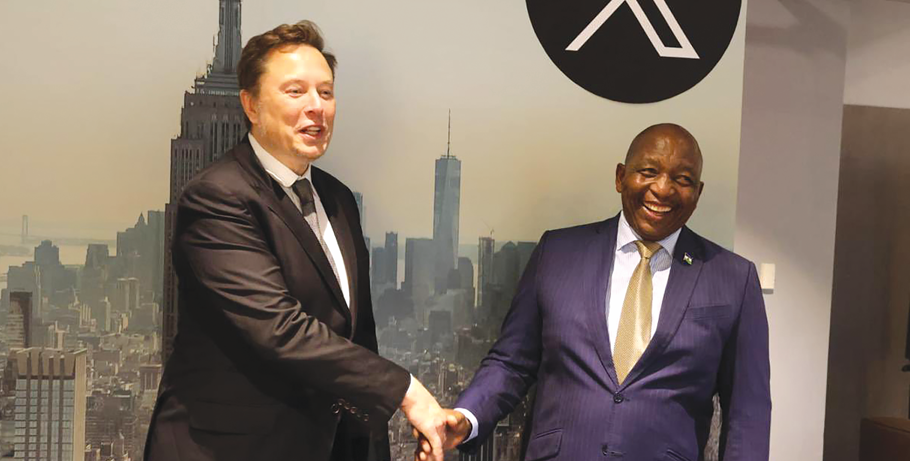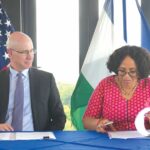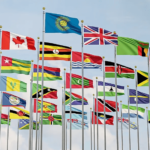… Risks LCA independence in desperate Starlink gamble
Prime Minister Sam Matekane’s government is playing a dangerous game –dangling Starlink’s license as a diplomatic olive branch to the United States while trampling on the independence of the Lesotho Communications Authority (LCA).
In remarks at the Third Private-Public Dialogue (PPD) National Conference on Wednesday this week, Matekane appeared to offer Starlink’s pending license as part of Lesotho’s effort to remove “obstacles to U.S. investment,” sparking fears of political interference in the LCA’s statutory mandate.
He said: “We are actively removing obstacles to U.S. investment, addressing issues like Starlink, energy, and hospitality investment approvals.”
The comments come as Lesotho reels from the economic shock of new U.S. tariffs. Earlier this month, president Donald Trump’s administration slapped a 50 percent levy – temporarily paused for 90 days but still carrying a baseline 10 percent tariff – on imports from Lesotho, claiming the country imposes a 99 percent duty on American goods.
Trade Minister Mokhethi Shelile has dismissed the claim as baseless.
Lesotho’s textile industry, which employs about 30,000 workers and heavily depends on U.S. exports, is now on the brink of collapse. Amid this crisis, Matekane’s administration is scrambling to attract U.S. goodwill, potentially at the expense of institutional integrity.
Starlink, a satellite internet company under Elon Musk’s SpaceX, applied for a license with the LCA in April 2024.
According to Section 3(3) of the Communications Act, “In the performance of its functions, the Authority shall be independent and not subject to control by any person or authority.”
Yet, the Prime Minister’s remarks have raised concerns about whether political pressure is being applied to fast-track Starlink’s application.
It is the LCA’s job to decide whether Musk’s satellite fleet gets to beam into Lesotho, not the government’s. While the Prime Minister might be eager to roll out the red carpet, it is the regulator who holds the remote control.
LCA has moved to reassure the public of its independence and procedural integrity in the ongoing review of Starlink’s license application.
In response to a formal inquiry, LCA’s public affairs manager, Mothepane Kotele, confirmed to Newsday yesterday that she had not heard the Prime Minister’s remarks directly and therefore could not comment on their specific implications.
However, Kotele decisively pushed back against any notion that the Starlink licensing process has been politically influenced.
“Contrary to some popular narratives,” she said, “the process has been both independent and transparent from the outset.”
She disclosed that Starlink first submitted its application in April 2024, but the LCA realised that the existing regulatory framework was not adequately equipped to handle the unique characteristics of low-earth orbit (LEO) satellite services.
This prompted a comprehensive review of the licensing framework.
She explained that the LCA then opened the process for public consultation, allowing stakeholders to submit comments.
In a rare show of regulatory openness, the authority invited those who submitted feedback for one-on-one meetings “to further unpack their submission because the Authority believes that comments often sound more reasonable in person,” Kotele noted.
The revised rules were gazetted on January 31, this year, paving the way for the authority to formally begin processing Starlink’s application. Once again, the public was invited to comment, with the second consultation period closing on March 20, 2025.
“All comments received were duly shared with Starlink, who have since provided their responses,” Kotele said. “The Authority is now in the process of compiling a comprehensive report for the Board’s consideration. Once this is complete, the Authority will pronounce itself accordingly,” she added.
Asked directly whether the Prime Minister’s comments risk undermining LCA’s statutory independence, Kotele did not engage in speculation but instead emphasised the LCA’s continued commitment to “a fair, independent and participatory process – even if it occasionally moves at the speed of governance rather than the speed of light.”
Newsday revealed last month that Vodacom Lesotho (VCL), the country’s leading mobile network operator, has called for Starlink to establish local shareholding, despite the Lesotho Communications Act of 2012 not mandating it.
VCL argues that local ownership would promote economic empowerment, create jobs, and drive infrastructure development in the communications sector.
“Local involvement may foster partnerships with domestic businesses, thereby, creating investment opportunities and ensuring broader economic inclusion,” said VCL Managing Director, Mohale Ralebitso, in written comments submitted to LCA on March 20, this year.
“Furthermore, local shareholding would boost government revenues through taxes and dividends. As is standard practice with terrestrial providers, which are required to have local shareholding, Starlink should also have to this principle to ensure that a portion of its revenues is within the country, Ralebitso added.
VCL is itself partly locally owned. It started operating in Lesotho in 1996 with the government of Lesotho as a shareholder through its stake in Lesotho Telecommunications Corporation.
When the government began its privatisation process in 1999, it invited bids for this share in Vodacom Lesotho. In July 2000, Sekha-Metsi Consortium, a group of local business people and public figures, was announced as the successful bidder.
Sekha-Metsi holds a 20 percent share in Vodacom Lesotho with the remaining share held by Vodacom Group, which is majority-owned by Vodafone (65.1 percent holding), one of the world’s largest communications companies by revenue.
In its submission to LCA, VCL not only requested that Starlink establish local shareholding and a local presence but also stated that if Starlink intends to provide services directly to end-users without partnering with a local licensee, the satellite operator must obtain a unified licence and adhere to all existing obligations set by the LCA for unified licensees.
“However, it should not be mandatory for Starlink or, by extension, satellite service providers to hold a local licence in situations where satellite operators collaborate with local licensees to offer connectivity to end-users,” Ralebitso said.
He further requested that the LCA ensure Starlink is subject to the same compliance obligations as other licensees, such as licence commitments, to guarantee a level playing field.
Matekane’s broader PPD address framed Lesotho’s economic challenges as a call to action, citing “global economic uncertainty, trade shocks, and persistently high unemployment.”
He outlined plans to diversify the economy into automotive, renewable energy, and agro-processing sectors, alongside new policies like an Investment Policy and Special Economic Zones.
Supported by the World Bank, African Development Bank, and others, the government is also advancing projects in agriculture, infrastructure, and regional trade connectivity.
However, his Starlink comments have overshadowed these efforts and cast doubt on whether Lesotho’s institutions can withstand the political pressures of an economic crisis.
Summary
- Prime Minister Sam Matekane’s government is playing a dangerous game –dangling Starlink’s license as a diplomatic olive branch to the United States while trampling on the independence of the Lesotho Communications Authority (LCA).
- In remarks at the Third Private-Public Dialogue (PPD) National Conference on Wednesday this week, Matekane appeared to offer Starlink’s pending license as part of Lesotho’s effort to remove “obstacles to U.
- Asked directly whether the Prime Minister’s comments risk undermining LCA’s statutory independence, Kotele did not engage in speculation but instead emphasised the LCA’s continued commitment to “a fair, independent and participatory process – even if it occasionally moves at the speed of governance rather than the speed of light.

Authored by our expert team of writers and editors, with thorough research.









